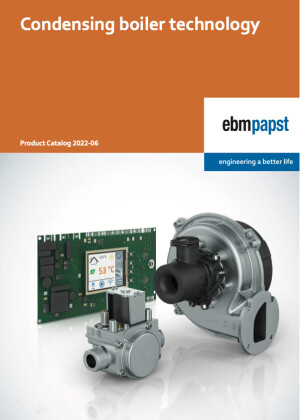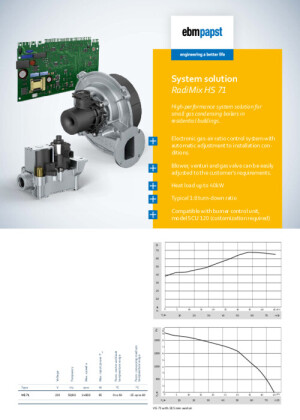ebm‑papst: High-performance and H₂‑ready gas blowers for every boiler generation
From high-temperature robustness to maximum modulation: ebm-papst gas blowers accompany the evolution of gas heating

In a rapidly evolving energy landscape, with Europe moving towards decarbonisation and the adoption of renewable technologies, gas heating continues to play a key role. The installed base of gas boilers – both traditional and condensing – remains very large, and in many non-EU markets the demand for new generation gas systems is still very strong.
In this context, manufacturers and installers must be able to rely on reliable, efficient and ready-to-support components for the energy transition. ebm-papst gas blowers represent a complete and technologically advanced response: solutions designed to optimize the performance of existing generators and to power new-generation boilers, increasingly oriented to operate with renewable gas mixtures such as hydrogen.
Gas blower for traditional systems: robustness and resistance up to 250 °C
Traditional gas heating systems – such as atmospheric boilers, hot air generators or stoves – pose specific technical challenges. Gas blowers for these applications must work under harsh conditions, with flue gas temperatures of up to 250 °C.
To meet these needs, ebm-papst has developed radial blowers designed to ensure:
- maximum thermal reliability thanks to the use of high-performance materials and construction technologies;
- long operating life with motors decoupled from the hot air flow and bearings lubricated for life;
- low noise even under continuous operating conditions;
- high integration flexibility , with the possibility of configuring the system with pressure switches, flanges, tachometric sensors and other plug-in options.
These features make ebm-papst blowers ideal not only for residential applications, but also for high-power industrial and commercial systems, offering stable and reliable performance even in the most intense work cycles.
RadiMix: the platform for high efficiency condensation and advanced modulation
Alongside its traditional heating solutions, ebm-papst also offers an innovative range for the condensing segment: the RadiMix platform, designed to guarantee maximum efficiency and fine regulation of combustion.
RadiMix is based on a single EC GreenTech motor platform that allows it to cover a wide range of thermal powers, up to 150 kW , adapting to both residential and light-commercial system needs.
The main advantages of the RadiMix range include:
- modulation up to 1:10, for always optimal combustion and reduced consumption;
- compact design (up to 15% smaller than previous generations), which simplifies integration even in wall-mounted boilers or in small technical spaces;
- low noise , an essential requirement for systems installed in inhabited environments;
- full integration with venturi, gas valves and combustion controls, for a plug-and-play system that facilitates certification and reduces time-to-market for manufacturers.
Thanks to these features, the RadiMix platform is today one of the reference solutions for manufacturers of condensing boilers who want to combine maximum efficiency, regulatory compatibility and ease of design.
A safe transition to hydrogen: components already tested and certified
The decarbonisation of heating also involves the progressive introduction of hydrogen into gas networks. To anticipate this scenario, ebm-papst has already developed and certified a range of blowers compatible with H₂ mixtures up to 20%:
- G1G 170, G3G 200, G3G 250 for traditional applications;
- the entire RadiMix platform for condensation.
These solutions enable OEMs and installers to offer products that are ready to face the energy transition, ensuring operational continuity even when the composition of network gas evolves in the coming years.
In parallel, ebm-papst is pushing ahead with the development of new versions, designed to optimally handle mixtures with even higher hydrogen percentages of up to 100%.
With this strategy, the company confirms its commitment to supporting manufacturers in the design of increasingly sustainable and low-emission systems, without compromising reliability, efficiency and ease of integration.






